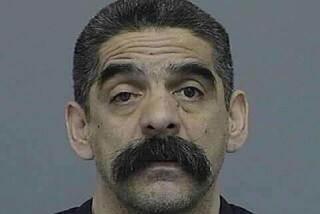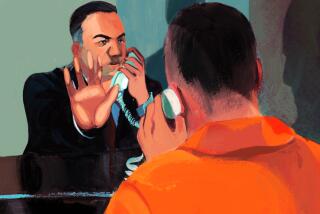U.S. Backed His Plan to Raid Cuba, Man Says
The Upland man accused of selling guns illegally from his home said in a jailhouse interview Thursday that some of the weapons were covertly supplied to him by the U.S. government, intended for an attempt to overthrow Cuban leader Fidel Castro.
Police say felon Robert Ferro had 1,571 firearms and some hand grenades stashed inside secret compartments and hidden rooms he built inside the sprawling foothill estate. He was arrested last week after a search of his home in connection with another case uncovered the weapons.
But in an interview Thursday, Ferro, 61, contended that some of the high-powered weapons -- including assault rifles, silencer-equipped handguns and Uzis -- were supplied to him by the U.S. government. He said the weapons were supposed to be used in an attempt to oust Castro that would have coincided with U.S. Navy operations being conducted in the Caribbean Sea.
“Obviously, now it will not take place,” Ferro said. “Those guns I had were very sophisticated weapons. It was for a fight. I was just trying to mimic what President Bush has done in Iraq, bring freedom to the country.
“I was born [in Cuba]. I want to free them. I love freedom. I love [the U.S.], and I want the same thing for my country.”
U.S. military officials acknowledged that 6,500 sailors on several ships and the Virginia-based carrier George Washington are participating in an exercise with at least eight other navies in international waters in the Caribbean. Although the exercise will come as close as 12 miles to Cuba’s territorial waters, military officials said it would primarily be hundreds of miles away from the island nation.
One military official said the idea of a U.S. invasion of Cuba “sounds like it’s coming from a guy living in a mental time warp, stuck back in the Bay of Pigs. This is 2006, not 1961.”
Pentagon spokesman Lt. Cmdr. Jeffrey D. Gordon said, “Clearly, these allegations [by Ferro] have no merit and have no basis in fact.”
Ferro was arrested last week by officers with L.A. IMPACT, a Southern California multi-agency task force, as they investigated his connection to Frank Fidel Beltran, 36, a fugitive arrested in late March while living in a Rancho Cucamonga rental home owned by Ferro.
Beltran was wanted on suspicion of shooting a Glendora police officer in the hand after the officer responded to a domestic dispute between Beltran and his wife. A few weeks later, Beltran shot his wife eight times at a San Dimas intersection after pursuing her in his vehicle, a Los Angeles County sheriff’s official said. The woman remains hospitalized, and the gun has not been found, authorities said.
According to police, Beltran is an associate of a Pomona street gang. When he was arrested, authorities said, he had two guns, including a silencer-equipped handgun, similar to weapons found in Ferro’s home.
The U.S. attorney’s office has charged Ferro with one count of possessing unregistered firearms, but Thom Mrozek, spokesman for the office, said additional charges, including harboring a fugitive, could be added before his scheduled May 10 arraignment in U.S. District Court in Riverside.
Investigators say the Ferro-Beltran link leads them to believe Ferro was selling the guns for profit on the street. The U.S. Bureau of Alcohol, Tobacco, Firearms and Explosives is tracing the guns, but that could take months, bureau spokesman John D’Angelo said Thursday.
During the jailhouse interview, Ferro denied law enforcement assertions that he was a friend of Beltran and that he had provided him and others with weapons. He said Beltran “did some work for him” a few times and moved into the Ferro-owned home without his approval while Beltran’s brother did some repair work on the property.
Ferro, who says he’s a member of a Miami-based group, Alpha 66, that advocates the overthrow of Castro’s regime, said Thursday that about 50 other U.S. citizens were scheduled to accompany him to Cuba, with further assistance coming from people inside Cuba.
FBI spokeswoman Laura Einmiller said her office was investigating the possibility that other anti-Castro sympathizers connected to Ferro had stashed weapons in their homes.
“Mr. Ferro’s motives, and all aspects of what Mr. Ferro’s statements have been -- whether or not he was planning violent acts -- are under investigation,” she said. “No one else has been arrested in this matter.”
Alpha 66 leader Ernesto Diaz said last week that Ferro was not a member of the group.
In the 1990s, Ferro was sentenced to two years in prison for possessing 5 pounds of the putty-like explosive C-4. In a 1991 raid, police said Ferro, then a licensed gun dealer, was arrested at the Upland home, where deputies seized an illegal assault rifle and semiautomatic shotgun. About 300 legal firearms were not confiscated.
Prosecutors in the 1990s case said Ferro was an Alpha 66 member training Mexicans at a Pomona chicken ranch he owned for a Castro overthrow attempt.
“This is something I’ve wanted to do,” said Ferro, who cried as he explained being forced to leave Cuba in 1960 after the death of his older sister, Elena Garcia Ferro, and a male cousin in a military convoy accident that Ferro said he learned were killings staged by Castro’s secret police.
“I was third in line to be killed. My father learned this from a [Castro] commandant. I came home from [medical] school as an 18-year-old one day, and my father sent me on a plane to Miami.”
Under Castro, Ferro said, his family’s stature was reduced. He said his father was a doctor who owned poultry farms and his relatives had served as senators in an eastern Cuba province.
Ferro said he performed odd jobs when he arrived in Miami -- busboy, paperboy and window washer -- until his family reunited in 1961. He entered the military and ultimately joined the Army’s Special Forces, performing covert operations that included a search for missing servicemen in Vietnam, he said. Military officials did not return calls seeking comment.
Ferro showed a Special Forces tattoo on his right bicep, reading “De Oppresso Libre” -- Free From Oppression.
“We fight for freedom,” he said. “I’m advocating the same thing President Bush is doing in Iraq for my country, that’s all. I don’t know why I’m in trouble for that.”
Ferro said he amassed his fortune by running chicken ranches from 1978 to 1989, buying and selling up to 60 homes since then, and owning his own drilling business that dug cable lines. Ferro’s wife owns an Upland collectibles store, where authorities say some of the guns were sold on an appointment-only basis.
“Real estate is a good business. That’s where my money came from, not guns,” Ferro said. “I don’t have any [hidden] cash. I never took any money from anybody for guns.”
Ferro, denied bail during a court hearing last week, faces a possible 10-year prison sentence on the gun charge. Tears streamed down his face as he discussed the effect his arrest has had on his wife, Maria, and their four children. He said he regretted stashing the guns in his home.
“They have nothing to do with my drive to bring freedom to Cuba,” Ferro said of his family. “I’m putting them through hell, and they deserve better. I don’t want to put my family through this anymore.
“I’m 61 now, with heart problems and diabetes. My time is short. For me, it’s over, and I feel very bad and very sad about that.”
More to Read
Sign up for Essential California
The most important California stories and recommendations in your inbox every morning.
You may occasionally receive promotional content from the Los Angeles Times.











